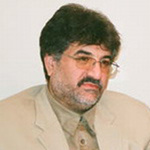The Cold War between Iran and the U.S.
A Brief Interview with Naser Hadian.

IRD: Hillary Clinton has said that if Ahmadinejad comes to the NPT review conference and announces that Iran abides by the NPT regulations, that would be good news. Could this conference serve as a reminder for both Iran and the U.S. to rethink their interaction?
NH: Overhauling Iran-U.S. relations is not an easy task. The current circumstances do not present a promising picture, either. Throughout the years since the Islamic Revolution, a ‘reward structure’ has developed in the political system of both countries that encourages the continued freeze of relations and punishes those who take any step towards reconciliation.
As long as this structure continues to function, hopes for improved ties are vain. Iran and the U.S. are now in a state of Cold War. It has ups and downs, but never disappears. Transforming this structure calls for strong determination in the political system of both countries. That is not what we are witnessing today, however.
IRD: Against this backdrop, Washington is trying to form a global consensus against Tehran and has tried to render Iran’s nuclear program an international concern. What do you see in this trend?
NH: Washington has followed a macropolicy based on containment and selective contact in its relations vis-à-vis Tehran. I believe this policy started from the time Robert Gates entered George Bush’s cabinet, and it continues to the present day.
The Bush administration was not successful in carrying out this policy, however, since it had lost the required international authority and prestige to do so. Obama, on the other hand, still possesses considerable international popularity. This has given the U.S. diplomatic apparatus a chance to follow the macropolicy against Tehran.
This is a multifaceted policy. On the political side, the United States is trying to isolate Iran on the diplomatic scene. In the economy, it imposes sanctions either unilaterally or through the UN Security Council. And from a military aspect, it prioritizes deterrence and upgrading defense systems of regional allies.
IRD: How successful has Washington been in forming the global consensus against Tehran and creating a worrisome picture of Iran’s nuclear program for the international community?
NH: As I’ve mentioned, Obama’s popularity has increased U.S. maneuverability in implementing an Iran containment policy, but to gauge whether Washington has achieved anything, we need different criteria. Washington has failed to change Iran’s behavior; to persuade or pressure it to freeze uranium enrichment, to stop it from supporting Hamas and Hezbollah, or to get Iran on board with the Middle East peace process. If the ultimate goal is changing Tehran’s regional and international behavior, Washington has surely failed, but if we are talking about Washington’s efforts to form a broader alliance against Iran’ nuclear program, then those efforts might be deemed successful.
Naser Hadian is professor of Tehran University and Iran-U.S. affairs analyst.
NH: Overhauling Iran-U.S. relations is not an easy task. The current circumstances do not present a promising picture, either. Throughout the years since the Islamic Revolution, a ‘reward structure’ has developed in the political system of both countries that encourages the continued freeze of relations and punishes those who take any step towards reconciliation.
As long as this structure continues to function, hopes for improved ties are vain. Iran and the U.S. are now in a state of Cold War. It has ups and downs, but never disappears. Transforming this structure calls for strong determination in the political system of both countries. That is not what we are witnessing today, however.
IRD: Against this backdrop, Washington is trying to form a global consensus against Tehran and has tried to render Iran’s nuclear program an international concern. What do you see in this trend?
NH: Washington has followed a macropolicy based on containment and selective contact in its relations vis-à-vis Tehran. I believe this policy started from the time Robert Gates entered George Bush’s cabinet, and it continues to the present day.
The Bush administration was not successful in carrying out this policy, however, since it had lost the required international authority and prestige to do so. Obama, on the other hand, still possesses considerable international popularity. This has given the U.S. diplomatic apparatus a chance to follow the macropolicy against Tehran.
This is a multifaceted policy. On the political side, the United States is trying to isolate Iran on the diplomatic scene. In the economy, it imposes sanctions either unilaterally or through the UN Security Council. And from a military aspect, it prioritizes deterrence and upgrading defense systems of regional allies.
IRD: How successful has Washington been in forming the global consensus against Tehran and creating a worrisome picture of Iran’s nuclear program for the international community?
NH: As I’ve mentioned, Obama’s popularity has increased U.S. maneuverability in implementing an Iran containment policy, but to gauge whether Washington has achieved anything, we need different criteria. Washington has failed to change Iran’s behavior; to persuade or pressure it to freeze uranium enrichment, to stop it from supporting Hamas and Hezbollah, or to get Iran on board with the Middle East peace process. If the ultimate goal is changing Tehran’s regional and international behavior, Washington has surely failed, but if we are talking about Washington’s efforts to form a broader alliance against Iran’ nuclear program, then those efforts might be deemed successful.
Naser Hadian is professor of Tehran University and Iran-U.S. affairs analyst.

